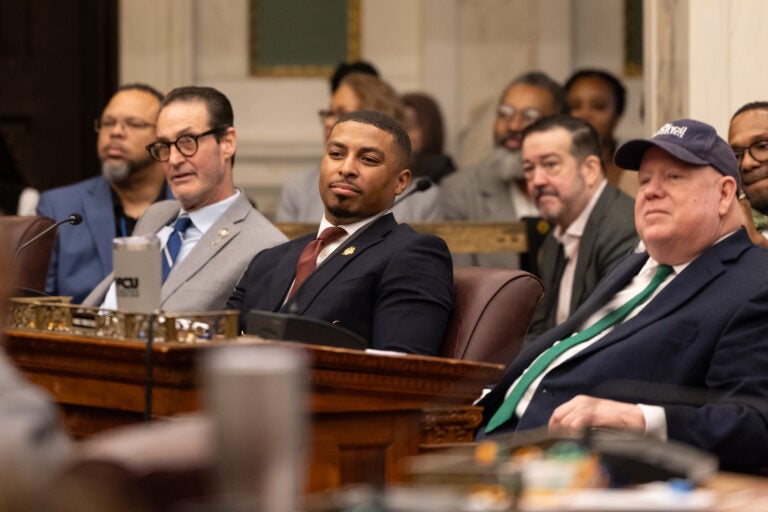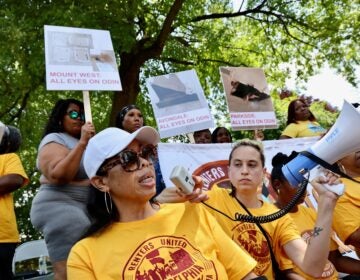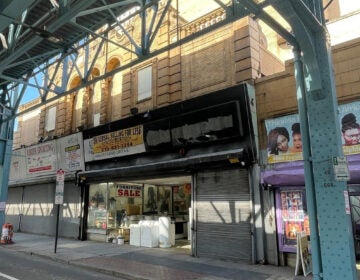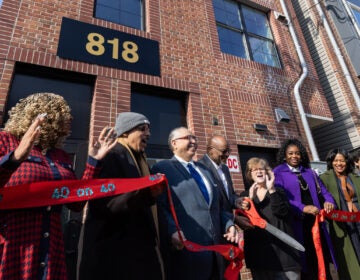Philly lawmaker wants to add ‘muscles’ and ‘teeth’ to city’s property maintenance code
City Councilmember Nicolas O’Rourke is set to introduce a legislative package designed to protect tenants and hold landlords accountable.
Listen 1:00
Philadelphia City Councilmember Nicolas O’Rourke listens the Mayor Cherelle Parker’s budget address on March 13, 2025. (Kimberly Paynter/WHYY)
Have a question about Philly’s neighborhoods or the systems that shape them? PlanPhilly reporters want to hear from you! Ask us a question or send us a story idea you think we should cover.
A Philadelphia lawmaker wants the city to create a relocation fund for tenants facing displacement after their property is “deemed uninhabitable” by city inspectors.
Under proposed legislation, the city would be authorized to issue one-time payments to these tenants, who often cannot afford to relocate without assistance.
The bill does not specify how much eligible tenants could receive through the fund.
City Councilmember Nicolas O’Rourke said the measure aims to incentivize landlords to make needed repairs and empower tenants to report hazardous living conditions — even if they might displace them.
Housing advocates say many low-income renters keep quiet out of fear of being displaced amid an affordable housing crisis. O’Rourke wants to put a stop to that.
“We gotta put some muscles, some teeth in this thing. Residents who have their lives turned upside down deserve a sense of security,” O’Rourke said.
The bill is part of a legislative package O’Rourke is set to introduce Thursday over objections from the city’s largest landlord advocacy group.
The Safe Healthy Homes Act, drafted in partnership with OnePA Renters United Philadelphia, is guided by three rights — the right to safety, the right to repairs and the right to relocation — the lawmaker says tenants must have at their disposal, particularly at a time when historically high rents are putting more pressure on cost-burdened renters.
“We need legislation like this to stop absentee corporate landlords from neglecting their tenants and properties, while still expecting rent,” said Seneca Grant, a member of Renters United who lives in West Oak Lane. “We should not have to live in fear of our landlords retaliating against us when we speak out about our living conditions.”
Creating a level of safety
O’Rourke’s legislation specifically takes aim at Philadelphia’s property maintenance code.
In addition to the anti-displacement fund, O’Rourke wants to give the city’s Department of Licenses and Inspections more power — and funding — to enforce the code.
The department, for example, currently has the authority to immediately suspend a landlord’s rental license if a property is deemed “unfit and unsafe or imminently dangerous.” O’Rourke wants the department to automatically suspend a landlord’s license if they have not appealed the designation after 30 days. The suspension would remain in place until the landlord has made any necessary repairs.
Under the legislation, the department and the landlord would be required to notify tenants that there is no active license for the property. Under city law, it is illegal for landlords to collect rent without a valid license.
“We gotta put a timer on how long a landlord can be negligent before their license is actually revoked. It can’t be as arbitrary as it is currently,” O’Rourke said.
The department would consider a dwelling unfit if there is sewage backed up in the basement or a lack of heat in the winter. Inspectors would consider a property unsafe or imminently dangerous if there are serious problems with the structure, including the possibility or likelihood of a collapse.
O’Rourke’s measure also gives tenants the ability to collect damages if they file a lawsuit for non-compliance and they are successful. This would include monetary damages of up to $2,000 per unit or compensatory damages in the form of a refund for any rent collected illegally.
The legislative package is also designed to better protect low-income tenants who speak out about hazardous living conditions at rental properties. Housing advocates say the city has a history of landlords retaliating against these tenants, creating a chilling effect that can keep people in harm’s way.
If the legislation is approved, landlords would be expressly barred from ending or modifying a tenant’s lease simply because that tenant is cooperating with a city investigation, has discussed their living conditions with a councilmember or news reporter, or joined a tenant organization.
The legislation also defines tenant harassment and provides examples, which include “failing to perform or complete repairs and maintenance in a timely manner,” “interfering with a tenant’s quiet enjoyment of their residence,” and “threatening a tenant or their guests with physical harm.”
“We want to make sure that the housing that’s being provided is humane in the first place. And I think when humans are allowed to speak out without fear of retaliation or harassment for speaking out, then I think we’re only creating that level of safety,” O’Rourke said.
Under the measure, a court could award compensatory damages and restitution if a judge finds that a landlord has violated the law.
Stronger enforcement needed
HAPCO Philadelphia, the city’s largest advocacy group for landlords and property managers, supports the city going after negligent landlords but argues O’Rourke’s bills are unnecessary and potentially harmful to law-abiding landlords.
Paul Cohen, general counsel for HAPCO, said the city already has laws in place to protect tenants.
“The argument is that it’s not being enforced. The answer is to enforce it. It’s very simple. Having another bill doesn’t get it enforced,” Cohen said. “We’re just gonna have another law that’s not going to be enforced.”
O’Rourke’s legislation is also part of a broader push to improve living conditions for low-income renters in Philadelphia.
In late February, OnePA Renters United Philadelphia and Philly Thrive launched their “Safe Healthy Homes” campaign with a news conference outside City Hall.
The groups want the city’s next budget to include $10 million for Licenses and Inspections to perform proactive inspections, and another $10 million for the Built to Last program, a repair program for low-income homeowners.
O’Rourke supports those goals.
Parker’s latest spending plan, which calls on the city to borrow $800 million for housing initiatives, does not include new funding for Built to Last, though the administration has indicated it would like the initiative to continue.
The popular program received $5 million for the fiscal year ending June 30. A mayoral spokesperson has called the funding a “one-time” allocation.

Subscribe to PlanPhilly
WHYY is your source for fact-based, in-depth journalism and information. As a nonprofit organization, we rely on financial support from readers like you. Please give today.









